The return of the caveman – 10 years enlargement – new ESI fellows scheme
- The return of the caveman
- What might have been…
- Azerbaijan chairmanship countdown
- ESI junior fellows – NEW Application Procedure from 1 May 2014
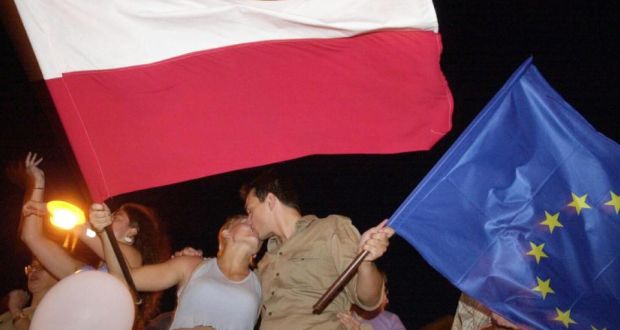 |
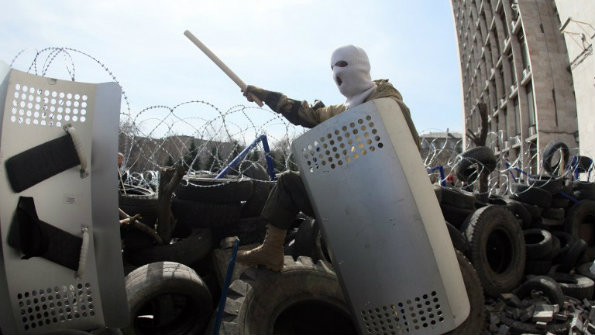 |
|
|
Pax europeana and the jungle: Poland celebrating 2004 – Ukraine suffering 2014 |
||
Dear friends,
In summer 1999, a group of friends gathered in Sarajevo and set up ESI. Now, in summer 2014, we will come together in Berlin to celebrate our first 15 years.
An anniversary is always a good moment for reflection: to look back and assess. To ask where to go next. To thank all those who have supported ESI until now.
ERSTE Stiftung in Vienna has been one of our most important donors for years. ERSTE funded a lot of our research on enlargement. It was the motor and donor behind our most ambitious project yet: the twelve-part Return to Europe documentary film series seen by five million people across Europe: one hour films on each country in the region between Albania, Croatia and Moldova. Starting this month, to celebrate our partnership, we will publish a collection of new essays on all twelve countries of the region: Return to Europe revisited. We will launch the series on 15 May with an ESI newsletter focusing on Macedonia:
Once a frontrunner, today a laggard: Has the EU lost Macedonia?
The return of the caveman
The film series "Return to Europe" was the exploration of a paradoxical idea. A European continent at peace, consisting of liberal democracies with open borders, had never existed before. So what was "normal" and what could one return to?
After communism had collapsed in Central Europe 25 years ago, some "realists" expected the new Europe to look very much like the old, pre-Cold War one. John J. Mearsheimer wrote in August 1990 Why we will soon miss the Cold War:
"Peace: it's wonderful. I like it as much as the next man, and have no wish to be willfully gloomy at a moment when optimism about the future shape of the world abounds. Nevertheless my thesis in this essay is that we are likely soon to regret the passing of the Cold War."
The early 1990s were not an age of European triumphalism but of great anxiety. This was an era of books like "Clash of Civilisations" (1993) or "Blood and Belonging" (1993). A time when a Canadian general, Major General Louis MacKenzie, head of the UN peacekeepers in Bosnia, told the US Congress in May 1993 that the law of the jungle was the true law of humanity: "Force has been rewarded since the first caveman picked up a club, occupied his neighbour's cave, and ran off with his wife." In fact many events following the end of the Cold War appeared to prove such "realism" right.
Fighting erupted in the South Caucasus (Armenia, Azerbaijan, Georgia). In Moldova. In former Yugoslavia. In the Northern Caucasus. There was a counter-insurgency campaign with tens of thousands of deaths in South-East Anatolia in the 1990s. Since then there have been wars in Georgia and now Ukraine. For Mearsheimer, none of this was a surprise:
"There is little room for trust among states because a state may be unable to recover if its trust is betrayed and each state must guarantee its own survival since no other actor will provide its security. States therefore seek to survive under anarchy by maximizing their power relative to other states. Relative power, not absolute levels of power, matter most to states. Aggression is a way to accumulate power at the expense of rivals."
And yet, there was one thing that realists had not expected. A transformative event, which many West Europeans remain unsure whether to celebrate on 1 May 2014: enlargement.
Take a map of Europe. Mark all the conflicts that erupted on the continent since 1989. You see that not one of them occurred in a country that was either a member of the EU and NATO, or between two countries striving to join these alliances.
The politics of deterrence did not return to Western Europe. On the contrary: the politics of peaceful integration extended a Pax Europaea across a huge new area. And the question, explored in our film series, was whether the same could also happen in the 21st century in all of South East Europe, from the Adriatic to the Dniester.
Mearsheimer was right, though, about the world just beyond that border of integration. It remains even now a geopolitical jungle, where countries eye each other with deep distrust.
It is worth remembering today how easily the great European enlargement could not have happened.
What might have been…
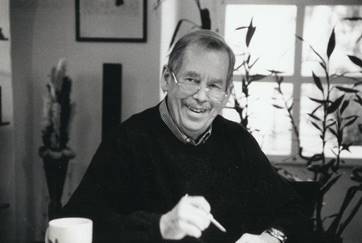 |
In 1996 the writer, former dissident, former political prisoner and then Czech president Vaclav Havel gave a presentation in Aachen, home of Charlemagne, on the border between Germany and France. As the 20th century was drawing to a close, Havel saw a huge opportunity for Europe:
"Europe now has a chance unprecedented in its entire previous history: it can build its order on the basis of agreement among all those concerned, of equality and of peaceful and democratic cooperation."
At the same time Havel warned: "The demons that have so fatally tormented European history – most disastrously of all in the 20th century – are merely biding their time." He noted:
"Failure to grasp this opportunity would, in both halves of Europe, open the door to all those who prefer confrontation rather than dialogue and who would rather define themselves as against others than as their neighbors. It is no good to pretend that people of this type do not exist anymore.
I know that neither the Union nor the North Atlantic Alliance can open themselves overnight to all those who aspire to join them… Six long years have passed since the fall of the Iron Curtain and it makes no sense to deny that – in spite of certain promising partial steps – little has actually happened in this respect."
There were many sceptics at the time. In his book "To the Castle and Back," Havel wrote in January 1995 about a meeting with US diplomat Richard Holbrooke: the US saw "Germany as the main stumbling block" to Czech entry into NATO. Holbrooke, Havel noted, "sees our entry into the EU as a long-term matter and strategically perhaps somewhat less important."
Let us imagine for a moment that the great enlargements had never happened. That in spring 2014, as Russian efforts to destabilise Ukraine spread panic across Eastern Europe, the Baltic States, Poland, Romania, Bulgaria would be unaligned, neither members of NATO or the EU. Today Russian diplomacy reaches out to hard-line friends even in the EU (from the Front National to Jobbik). How much easier and destabilising would it have been to do so in a nonaligned Central Europe?
In short, there was nothing normal about a Europe at peace. It was a bold and revolutionary vision. Contrary to the notion that the West was eager to expand, following the end of the Cold War, most European leaders had to be dragged, kicking and screaming, to accept to open their institutions to new members.
The first real breakthrough only came in spring 1999. There was a ceremony in the Truman library in Washington, DC. Foreign ministers of Poland, the Czech Republic and Hungary, the first former communist countries to join NATO, attended.
Polish foreign minister Bronislaw Geremek, like Vaclav Havel a former political prisoner, declared: "NATO enlargement is the most important event that has happened to Poland since the onset of Christianity."
There was US Secretary of State Madeleine Albright, whose Jewish Czech parents had fled from Prague in 1938, who added: "Hallelujah. Never again will your fates be tossed around like poker chips on a bargaining table. NATO enlargement is erasing the line drawn in Europe by Stalin's bloody boot."
There was Ron Asmus, who had indefatigably worked on the enlargement of NATO, and who described the scene later:
"I looked over at the Polish, Czech, and Hungarian delegations. A number of them had been imprisoned under communism in their fight for democracy and freedom. They had always dreamed of the day when they could join the West … When these Poles, Czechs and Hungarians had initially raised the issue of joining NATO in the early 1990s, many in the West had dismissed them as hopeless romantics. But they had persevered. They had always been part of the West in spirit. Now they were joining its military alliance. It was the fulfilment of their dreams and their triumph as well. Many of them were in tears."
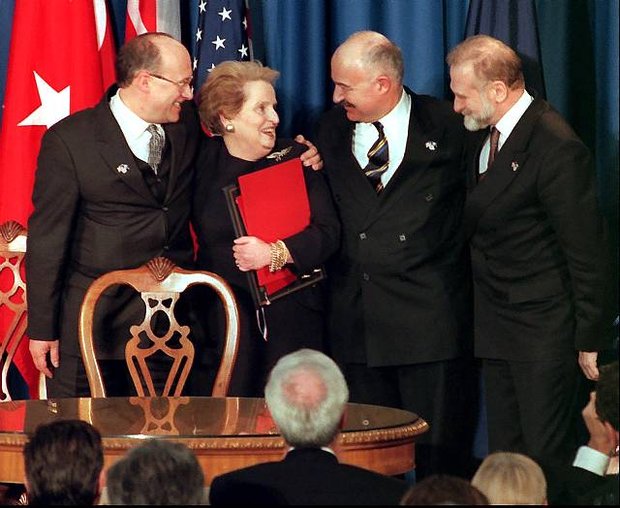 |
In hindsight, and seeing Ukraine descend into war, it is not difficult to understand these tears of joy. The question for the next decade is whether any Eastern partners will be able to follow the Czech Republic ... and perhaps, one day, enjoy a similar kind of certainty. As Vaclav Havel wrote in 2005, looking back:
"…the country is part of such a solid system of international relationships and guarantees that any form of subjugation coming from outside now seems virtually out of the question. I think that we have never, in our entire dramatic history, enjoyed this kind of certainty before."
Azerbaijan chairmanship countdown
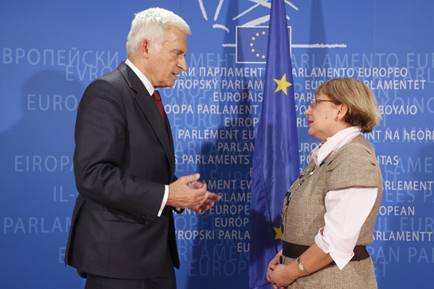 |
|
|
Leyla Yunus in the European Parliament. |
|
Last week we sent a newsletter and an open letter on Azerbaijan. We have since followed up with translations of the open letter in five languages. Please help us share this as widely as you can in your respective publics:
- Lettre ouverte concernant les prisonniers politiques en Azerbaïdjan
- Offener Brief zu politischen Häftlingen in Aserbaidschan
- Lettera aperta sulla questione dei prigionieri politici in Azerbaijan
- Carta abierta sobre los presos políticos en Azerbaiyán
- Ανοικτή επιστολή για τους πολιτικούς κρατούμενους στο Αζερμπαϊτζάν
Will there be any reaction by the Council of Europe? On 22-23 May 2014, there will be a meeting of the bureau of the Council of Europe Parliamentary Assembly in Baku. It will discuss a motion calling for a resolution on "Azerbaijan's Chairmanship of the Council of Europe: What follow-up on respect for human rights?":
"In the light of its forthcoming chairmanship of the Council of Europe Committee of Ministers, it is essential to address concerns regarding the implementation of fundamental freedoms and, especially, politically motivated detention, in Azerbaijan. The Assembly is, therefore, duty-bound to follow-up on these arrests and detentions in Azerbaijan."
We look forward to see what will happen. In the meantime the repression and arrests in Baku have continued unabated.
ESI junior fellows - NEW Application Procedure from 1 May 2014
In summer 2013 we announced a procedure for ambitious and gifted young analysts to join ESI as junior fellows. At the time we wrote the following:

Gerald Knaus
- Return to Europe documentary film series
- ESI research on EU enlargement
- Open letter to 125 current and former PACE members (23 April 2014)
- ESI on Azerbaijan: we made many presentations; some international media reactions; many events with policy makers across Europe.
- ESI junior fellows
- ESI in Zagreb: Lessons learnt from EU enlargement policy: What's next? (29 April 2014)
- ESI in Vienna: Conference on "Ten years after the 2014 enlargement - Achievements and next steps" (24 April 2014)
- Rumeli Observer: Kiev and the cost of EU enlargement on hold (21 February 2014)
